牛津译林版八年级下Unit 1 Past and Present Period 3 Grammar 课件(43张ppt)
文档属性
| 名称 | 牛津译林版八年级下Unit 1 Past and Present Period 3 Grammar 课件(43张ppt) | 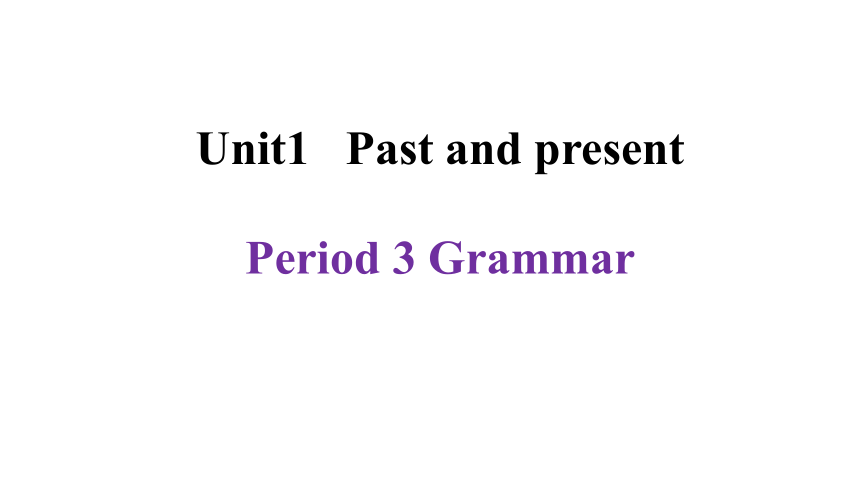 | |
| 格式 | ppt | ||
| 文件大小 | 422.0KB | ||
| 资源类型 | 教案 | ||
| 版本资源 | 牛津译林版 | ||
| 科目 | 英语 | ||
| 更新时间 | 2022-01-03 18:22:25 | ||
图片预览

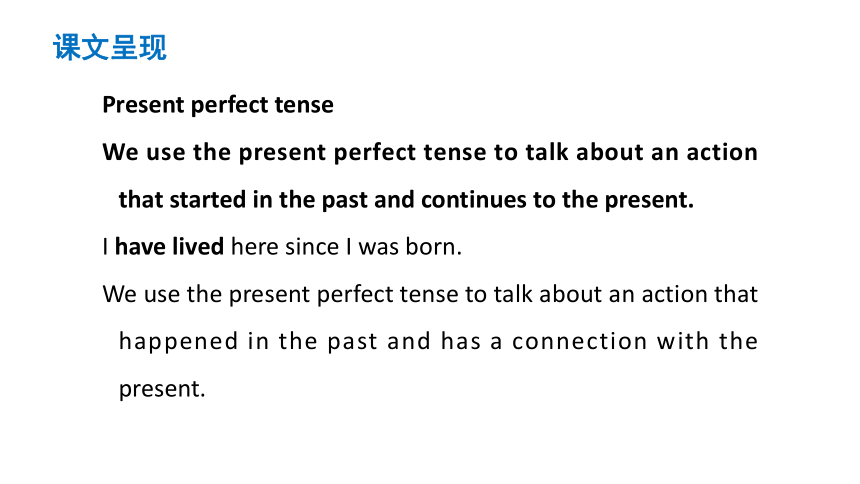


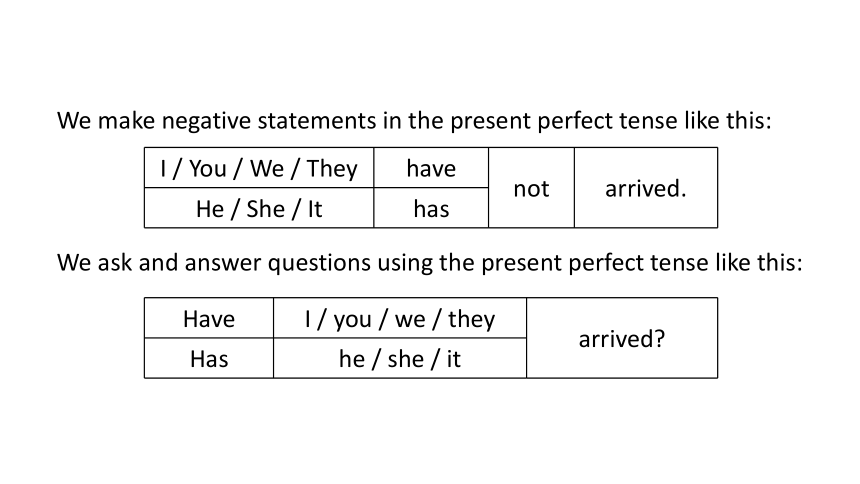




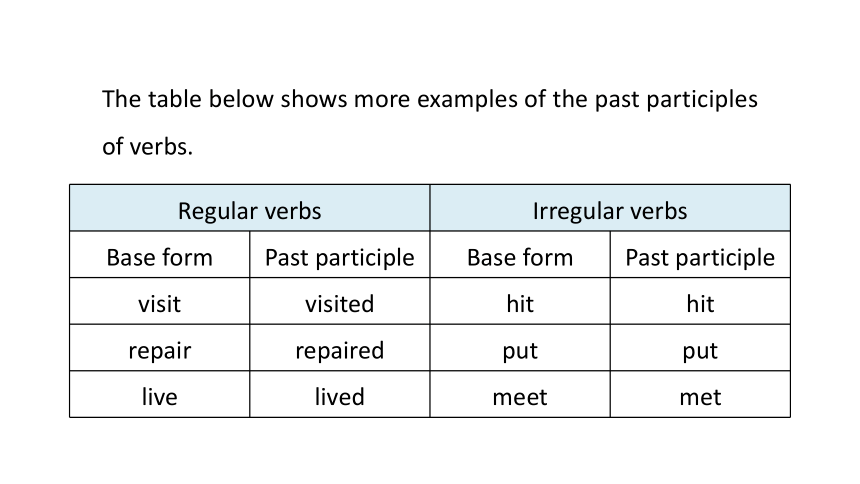

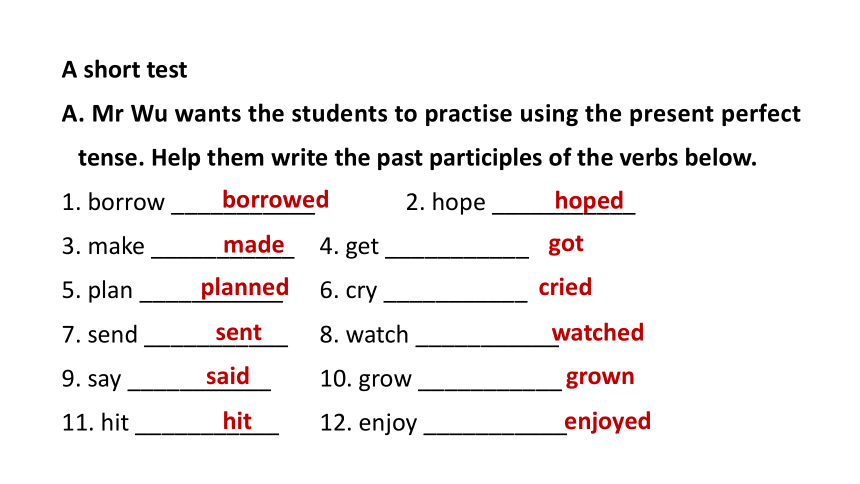
文档简介
(共43张PPT)
Unit1 Past and present
Period 3 Grammar
Present perfect tense
We use the present perfect tense to talk about an action that started in the past and continues to the present.
I have lived here since I was born.
We use the present perfect tense to talk about an action that happened in the past and has a connection with the present.
课文呈现
Eddie has just eaten Hobo’s food.
(Eddie ate the food, and now Hobo has nothing to eat.)
TIP
We can use these time expressions with the present perfect tense.
already yet ever never just recently since for
We also use the present perfect tense to talk about how many times an action has happened till now.
I have already read this book many times.
We make positive statements in the present perfect tense like this:
I / You / We / They have arrived.
He / She / It has
We make negative statements in the present perfect tense like this:
We ask and answer questions using the present perfect tense like this:
I / You / We / They have not arrived.
He / She / It has
Have I / you / we / they arrived
Has he / she / it
Yes, I / you / we / they have.
he / she / it has.
No, I / you / we / they haven’t.
he / she / it hasn’t.
TIP
have not = haven’t has not = hasn’t
We form the past participles of regular verbs by adding -ed, just as what we do to form the simple past tense of these verbs.
Most verbs + ed finish → finished
Verbs ending in -e + d change → changed
Verbs ending in a consonant + y -y + ied carry → carried
Short verbs ending in a vowel + a consonant double the consonant + ed stop → stopped
We form the past participles of irregular verbs differently. Here are some examples.
No change come → come hurt → hurt
Change the vowel hold → held win → won
Change the consonant lend → lent build → built
Change the vowel(s) and the consonant(s) catch → caught keep → kept
forget → forgotten tell → told
Others be → been have → had
fall → fallen fly → flown
draw → drawn see → seen
TIP
Turn to pages 122 and 123 for more changes of irregular verbs.
The table below shows more examples of the past participles of verbs.
Regular verbs Irregular verbs
Base form Past participle Base form Past participle
visit visited hit hit
repair repaired put put
live lived meet met
Regular verbs Irregular verbs
move moved make made
try tried sell sold
study studied give given
fit fitted write written
plan planned think thought
A short test
A. Mr Wu wants the students to practise using the present perfect tense. Help them write the past participles of the verbs below.
1. borrow ___________ 2. hope ___________
3. make ___________ 4. get ___________
5. plan ___________ 6. cry ___________
7. send ___________ 8. watch ___________
9. say ___________ 10. grow ___________
11. hit ___________ 12. enjoy ___________
borrowed
hoped
made
got
planned
cried
sent
watched
said
grown
hit
enjoyed
B. Mr Wu asks the students to complete the sentences below using the present perfect tense. Help them complete the sentences.
1. They _____________(finish) their homework already.
2. John never _____________(visit) China.
have finished
has; visited
3. Mr Li _____________(repair) over ten bicycles since Monday.
4. We _____________(not see) each other for years.
5. My parents _____________(not come) back yet. ①
6. Our teacher _____________(teach) us a lot about the history of China.
has repaired
haven’t seen
haven’t come
has taught
Chat time
C. Millie and Sandy are talking about a film about the history of plete their conversation with the correct forms of the verbs in brackets.
Millie: (1) ___________ you (see) any films recently, Sandy ②
Sandy: No, I haven’t. What about you
Have; seen
Millie: I (2) ___________ (see) one last Saturday.
Sandy: What’s it about
Millie: It’s about the changes in Beijing over the past century. From this film, I (3) _____________ (learn) more about Beijing’s past and present.
Sandy: Oh, I think I (4) ___________ (hear) about the film. Do you plan to see it again
Millie: Yes, I’d like to.
saw
have learned
have heard
① My parents ____________(not come) back yet.
yet /jet/ adv. 还, 仍
考点1
yet 为现在完成时的标志,用于否定句和疑问句中。对应词是already,意为“已经”,用于肯定句中。
考点精讲
e.g. He hasn’t come yet. What do you think has happened to him
他还没有来。你认为他发生了什么事?
My mother has already done the housework.
我妈妈已经做完了家务活。
The train hasn’t arrived yet.
火车还没有到达。
② _____ you _____ (see) any films recently, Sandy
recently /'ri sntli/ adv. 近来, 最近
e.g. Peter has made progress in math recently.
彼得最近在数学方面取得了进步。
Have you seen Mr Smith recently
你最近看到史密斯先生了吗?
There have been many changes in recent years.
近几年发生了许多变化。
考点2
现在完成时的标志词
adj. 最近的
现在完成时
现在完成时的定义及构成
考点1
定义
现在完成时表示过去发生的动作对现在产生的影响, 或者表示从过去某时间开始一直延续到现在的动作或状态。
考向1
语法沙龙
e.g. I have already seen the film.
我已经看过这部电影了。
(我已经知道这部电影的内容了)
We have lived here since last year.
自从去年以来我们就住在这儿。
(表示从去年一直延续到现在的动作)
构成
现在完成时由“助动词have/has + 动词的过去分词”构成。其否定形式是在have/has 后直接加not, 其疑问形式是将have 或has 提前, 其一般疑问句的肯定回答是“Yes, 主语 + have/has.”, 否定回答是“No, 主语 + haven’t/hasn’t.”。
考向2
e.g. He has lived in Nanjing since 2010.
自从2010 年以来他就住在南京。
I haven’t read the book yet.
我还没读过这本书。
—Have you finished the work yet
你已经做完这项工作了吗?
—Yes, I have. /No, I haven’t.
是的, 我已经做完了。/ 不, 我还没有做完。
(1)规则动词的过去分词的变化规则
考向3
变化规则 示例
a. 一般直接在词尾加-ed work—worked
open—opened
b. 以不发音的字母e 结尾的词直接加-d live—lived
skate—skated
c. 以“辅音字母+y”结尾的词, 变y 为i, 再加-ed study—studied
hurry—hurried
(2) 不规则动词的过去分词需牢记课本上的不规则动词表。
变化规则 示例
d. 以“元音字母+y”结尾的词, 直接加-ed play—played
stay—stayed
e. 以“元音字母+ 一个辅音字母”结尾的重读闭音节词,先双写这个辅音字母, 再加-ed stop—stopped
plan—planned
prefer—preferred
现在完成时的用法
考点2
表示过去发生或已经完成的某一动作对现在造成的影响或结果。多用瞬间动词。
e.g. He has lost his book.
他已经丢了他的书。
(过去丢的, 现在还没找到。)
考向1
表示动作或状态在过去已经开始, 持续到现在, 也许还要持续下去, 常和for, since 连用。表示持续的动作或状态, 多用延续性动词。
e.g. He has taught English for 20 years.
他已经教了20 年英语了。
We have known each other since ten years ago. 我们十年前就互相认识了。
考向2
对He has lived here since ten years ago./He has lived here for ten years. 对这两个句子中的画线部分提问应用how long。即How long has he lived here 他在这里生活多久了?
考向3
一、用所给词的适当形式填空
1. I ________________(not finish) my homework yet. I am afraid I can’t go to the park with you.[宿迁]
2. The young man _____________(live) alone since he graduated from college. [兰州]
3. He has the most beautiful blue eyes I have ever __________(see). [扬州]
haven’t finished
has lived
seen
课堂练习
4. Huawei has __________(get) the highest level in the 5G field in China, even in the world. [百色]
5. China __________(win) lots of high praises since we turned the sand into forests. [常州]
6. I ____________(know) Jimmy for over two days and now we are good friends.
7. —Why are the windows so dirty
— Because we _______________(not clean) them for a long time.
got
have won
have known
haven’t cleaned
8. So far, the couple ____________________(not change) their flat since they had a second child. [泰州]
9. Uncle Chen _______________(repair) more than five bicycles since last Friday. [宿迁]
10. This novel is very interesting. My brother ____________ (read) it three times. [绥化]
haven’t changed
has repaired
has read
二、单项选择
11. —The book is popular. _______ you _______ it yet
—Yes, I have. [天津]
A. Are; reading B. Were; reading
C. Have; read D. Will; read
C
12. Some primary and secondary schools __________ winter sports to their courses since Beijing won the right to host the 2022 Winter Olympic Games. [泰州]
A. added B. will add C. have added D. were adding
C
13. —Have you finished your homework
—__________. Just half of it. How about you [苏州]
A. Not at all B. Not likely
C. Not a bit D. Not yet
D
14. The documentary A Plastic Ocean is so impressive that I __________ it several times so far. [苏州]
A. watched B. watch
C. have watched D. will watch
D
15. —What good books did you read recently
—I __________ Tales of China since last year, and now the third time. [武汉]
A. read B. am reading C. have read D. will read
C
16. David Attenborough __________ 40 documentaries over the past 67 years. A Life on Our Planet is his latest work.
[连云港]
A. makes B. made C. has made D. is making
C
17. —__________ have you kept this book
—For two months. [武威]
A. How soon B. How old
C. How long D. How often
C
18. Lily has not cleaned her room __________.
A. already B. yet
C. since D. for
B
19. Has he ever __________ the USA
A. been B. gone
C. been to D. go
C
20. —__________ have you been learning English
—For over five years.
A. How long B. How often
C. How soon D. How far
A
本节课主要学习了:
重点单词:yet,recently
重点短语:teach sb. a lot,over the past century
重点句式:Eddie has just eaten Hobo’s food.
归纳新知
再见
Unit1 Past and present
Period 3 Grammar
Present perfect tense
We use the present perfect tense to talk about an action that started in the past and continues to the present.
I have lived here since I was born.
We use the present perfect tense to talk about an action that happened in the past and has a connection with the present.
课文呈现
Eddie has just eaten Hobo’s food.
(Eddie ate the food, and now Hobo has nothing to eat.)
TIP
We can use these time expressions with the present perfect tense.
already yet ever never just recently since for
We also use the present perfect tense to talk about how many times an action has happened till now.
I have already read this book many times.
We make positive statements in the present perfect tense like this:
I / You / We / They have arrived.
He / She / It has
We make negative statements in the present perfect tense like this:
We ask and answer questions using the present perfect tense like this:
I / You / We / They have not arrived.
He / She / It has
Have I / you / we / they arrived
Has he / she / it
Yes, I / you / we / they have.
he / she / it has.
No, I / you / we / they haven’t.
he / she / it hasn’t.
TIP
have not = haven’t has not = hasn’t
We form the past participles of regular verbs by adding -ed, just as what we do to form the simple past tense of these verbs.
Most verbs + ed finish → finished
Verbs ending in -e + d change → changed
Verbs ending in a consonant + y -y + ied carry → carried
Short verbs ending in a vowel + a consonant double the consonant + ed stop → stopped
We form the past participles of irregular verbs differently. Here are some examples.
No change come → come hurt → hurt
Change the vowel hold → held win → won
Change the consonant lend → lent build → built
Change the vowel(s) and the consonant(s) catch → caught keep → kept
forget → forgotten tell → told
Others be → been have → had
fall → fallen fly → flown
draw → drawn see → seen
TIP
Turn to pages 122 and 123 for more changes of irregular verbs.
The table below shows more examples of the past participles of verbs.
Regular verbs Irregular verbs
Base form Past participle Base form Past participle
visit visited hit hit
repair repaired put put
live lived meet met
Regular verbs Irregular verbs
move moved make made
try tried sell sold
study studied give given
fit fitted write written
plan planned think thought
A short test
A. Mr Wu wants the students to practise using the present perfect tense. Help them write the past participles of the verbs below.
1. borrow ___________ 2. hope ___________
3. make ___________ 4. get ___________
5. plan ___________ 6. cry ___________
7. send ___________ 8. watch ___________
9. say ___________ 10. grow ___________
11. hit ___________ 12. enjoy ___________
borrowed
hoped
made
got
planned
cried
sent
watched
said
grown
hit
enjoyed
B. Mr Wu asks the students to complete the sentences below using the present perfect tense. Help them complete the sentences.
1. They _____________(finish) their homework already.
2. John never _____________(visit) China.
have finished
has; visited
3. Mr Li _____________(repair) over ten bicycles since Monday.
4. We _____________(not see) each other for years.
5. My parents _____________(not come) back yet. ①
6. Our teacher _____________(teach) us a lot about the history of China.
has repaired
haven’t seen
haven’t come
has taught
Chat time
C. Millie and Sandy are talking about a film about the history of plete their conversation with the correct forms of the verbs in brackets.
Millie: (1) ___________ you (see) any films recently, Sandy ②
Sandy: No, I haven’t. What about you
Have; seen
Millie: I (2) ___________ (see) one last Saturday.
Sandy: What’s it about
Millie: It’s about the changes in Beijing over the past century. From this film, I (3) _____________ (learn) more about Beijing’s past and present.
Sandy: Oh, I think I (4) ___________ (hear) about the film. Do you plan to see it again
Millie: Yes, I’d like to.
saw
have learned
have heard
① My parents ____________(not come) back yet.
yet /jet/ adv. 还, 仍
考点1
yet 为现在完成时的标志,用于否定句和疑问句中。对应词是already,意为“已经”,用于肯定句中。
考点精讲
e.g. He hasn’t come yet. What do you think has happened to him
他还没有来。你认为他发生了什么事?
My mother has already done the housework.
我妈妈已经做完了家务活。
The train hasn’t arrived yet.
火车还没有到达。
② _____ you _____ (see) any films recently, Sandy
recently /'ri sntli/ adv. 近来, 最近
e.g. Peter has made progress in math recently.
彼得最近在数学方面取得了进步。
Have you seen Mr Smith recently
你最近看到史密斯先生了吗?
There have been many changes in recent years.
近几年发生了许多变化。
考点2
现在完成时的标志词
adj. 最近的
现在完成时
现在完成时的定义及构成
考点1
定义
现在完成时表示过去发生的动作对现在产生的影响, 或者表示从过去某时间开始一直延续到现在的动作或状态。
考向1
语法沙龙
e.g. I have already seen the film.
我已经看过这部电影了。
(我已经知道这部电影的内容了)
We have lived here since last year.
自从去年以来我们就住在这儿。
(表示从去年一直延续到现在的动作)
构成
现在完成时由“助动词have/has + 动词的过去分词”构成。其否定形式是在have/has 后直接加not, 其疑问形式是将have 或has 提前, 其一般疑问句的肯定回答是“Yes, 主语 + have/has.”, 否定回答是“No, 主语 + haven’t/hasn’t.”。
考向2
e.g. He has lived in Nanjing since 2010.
自从2010 年以来他就住在南京。
I haven’t read the book yet.
我还没读过这本书。
—Have you finished the work yet
你已经做完这项工作了吗?
—Yes, I have. /No, I haven’t.
是的, 我已经做完了。/ 不, 我还没有做完。
(1)规则动词的过去分词的变化规则
考向3
变化规则 示例
a. 一般直接在词尾加-ed work—worked
open—opened
b. 以不发音的字母e 结尾的词直接加-d live—lived
skate—skated
c. 以“辅音字母+y”结尾的词, 变y 为i, 再加-ed study—studied
hurry—hurried
(2) 不规则动词的过去分词需牢记课本上的不规则动词表。
变化规则 示例
d. 以“元音字母+y”结尾的词, 直接加-ed play—played
stay—stayed
e. 以“元音字母+ 一个辅音字母”结尾的重读闭音节词,先双写这个辅音字母, 再加-ed stop—stopped
plan—planned
prefer—preferred
现在完成时的用法
考点2
表示过去发生或已经完成的某一动作对现在造成的影响或结果。多用瞬间动词。
e.g. He has lost his book.
他已经丢了他的书。
(过去丢的, 现在还没找到。)
考向1
表示动作或状态在过去已经开始, 持续到现在, 也许还要持续下去, 常和for, since 连用。表示持续的动作或状态, 多用延续性动词。
e.g. He has taught English for 20 years.
他已经教了20 年英语了。
We have known each other since ten years ago. 我们十年前就互相认识了。
考向2
对He has lived here since ten years ago./He has lived here for ten years. 对这两个句子中的画线部分提问应用how long。即How long has he lived here 他在这里生活多久了?
考向3
一、用所给词的适当形式填空
1. I ________________(not finish) my homework yet. I am afraid I can’t go to the park with you.[宿迁]
2. The young man _____________(live) alone since he graduated from college. [兰州]
3. He has the most beautiful blue eyes I have ever __________(see). [扬州]
haven’t finished
has lived
seen
课堂练习
4. Huawei has __________(get) the highest level in the 5G field in China, even in the world. [百色]
5. China __________(win) lots of high praises since we turned the sand into forests. [常州]
6. I ____________(know) Jimmy for over two days and now we are good friends.
7. —Why are the windows so dirty
— Because we _______________(not clean) them for a long time.
got
have won
have known
haven’t cleaned
8. So far, the couple ____________________(not change) their flat since they had a second child. [泰州]
9. Uncle Chen _______________(repair) more than five bicycles since last Friday. [宿迁]
10. This novel is very interesting. My brother ____________ (read) it three times. [绥化]
haven’t changed
has repaired
has read
二、单项选择
11. —The book is popular. _______ you _______ it yet
—Yes, I have. [天津]
A. Are; reading B. Were; reading
C. Have; read D. Will; read
C
12. Some primary and secondary schools __________ winter sports to their courses since Beijing won the right to host the 2022 Winter Olympic Games. [泰州]
A. added B. will add C. have added D. were adding
C
13. —Have you finished your homework
—__________. Just half of it. How about you [苏州]
A. Not at all B. Not likely
C. Not a bit D. Not yet
D
14. The documentary A Plastic Ocean is so impressive that I __________ it several times so far. [苏州]
A. watched B. watch
C. have watched D. will watch
D
15. —What good books did you read recently
—I __________ Tales of China since last year, and now the third time. [武汉]
A. read B. am reading C. have read D. will read
C
16. David Attenborough __________ 40 documentaries over the past 67 years. A Life on Our Planet is his latest work.
[连云港]
A. makes B. made C. has made D. is making
C
17. —__________ have you kept this book
—For two months. [武威]
A. How soon B. How old
C. How long D. How often
C
18. Lily has not cleaned her room __________.
A. already B. yet
C. since D. for
B
19. Has he ever __________ the USA
A. been B. gone
C. been to D. go
C
20. —__________ have you been learning English
—For over five years.
A. How long B. How often
C. How soon D. How far
A
本节课主要学习了:
重点单词:yet,recently
重点短语:teach sb. a lot,over the past century
重点句式:Eddie has just eaten Hobo’s food.
归纳新知
再见
